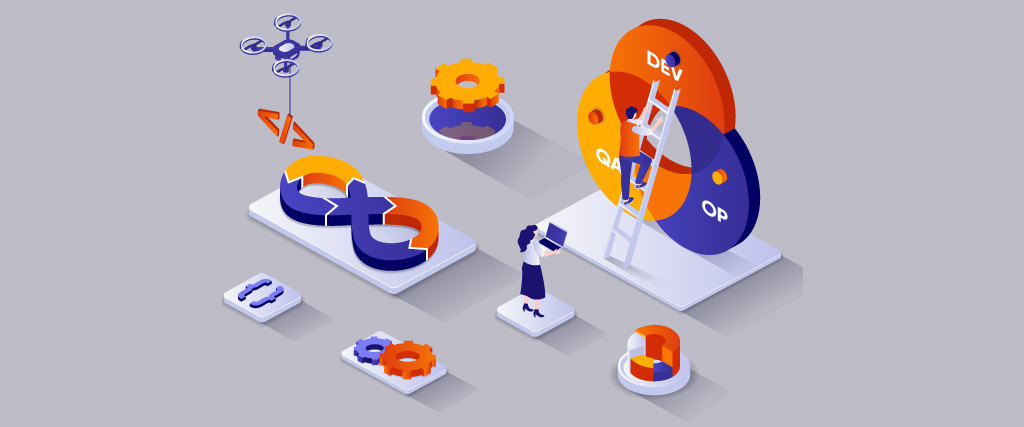Top 5 DevOps tools: What is Right for infrastructure automation & monitoring

Top 5 DevOps tools: If you want to facilitate your development process and achieve fast software delivery, DevOps is the right service! It is the key to infrastructure automation & monitoring. This automation integrates various departments that are included in software development makes their teamwork smooth and decreases time to market. Thanks to DevOps, users get 24/7 access to the app and become more admiring to the developer. Top 5 DevOps tools, So, what are the best DevOps tools? Continue to read this blog!
Top 5 DevOps tools for automation & monitoring
When it comes to choosing the right DevOps tools for automation & monitoring, there are different types of tools available in the market. Not all tools may fit all of your requirements. That’s why it is essential to prepare a customized toolkit for your infrastructure automation & monitoring. To help you with this task, there are the top five DevOps tools:# 1- Jenkins
If you want to monitor the performance of repetitive tasks, Jenkins is the right DevOps tool. It is a Java-based program for continuous integration and is often used for software development and testing processes. Main Features:- Ready to run out-of-the-box
- Continuous integration and continuous delivery solution
- Available for different operating systems such as Windows and Mac OS X
- Can integrate with every tool due to hundreds of plugins
- Provides security
- Doesn’t provide proper analytics
- Difficult to track changes made by other professionals
- Doesn’t provide an agile framework to manage various sandboxes
#2 - Vagrant - Top 5 DevOps tools
Vagrant is one of the best infrastructure automation tools that help develop, configure and manage lightweight virtual machine era. A developed VM can be easily reshared with other experts, so every team member has identical development environments. This DevOps tool focuses on lowering setup time and increasing equality among developers automatically. Main features:- Runs on great solutions such as VirtualBox, VMware and Hyper-V
- Creates portable work environments
- Simple setup process
- Plugins for cloud monitoring and configuration management tools
- Easy to track revisions
- Need a powerful PC to run
- Difficult to understand
#3 - Visual Studio IDE
If you are looking for a tool for all developers working on different platforms such as Android, iOS, web, and cloud, Visual Studio is the right choice! This DevOps tool uses MS development platforms such as Windows API, Windows Forms, Store, and Silverlight. It produces both native and managed code. Main features:- Provides a rich selection of development languages
- Develops and deploys the SQL Server and Azure SQL databases easily
- Supports syntax highlighting and code completion
- Includes a debugger for both source-level and a machine-level
- Includes a host of visual designers to help app development
- Allows developers to write extensions to extend the functionality of VS
- Free (for students and individual developers)
#4 - Apache - Top 5 DevOps tools
Apache is a mighty open-source web server built by the Apache Software Foundation. This fast DevOps tool supports various cross-language clients and protocols. It consists of easy-to-use enterprise integration patterns. Main features:- Compatible with several hardware configurations and OS such as Linux, Windows NT, macOS, and Unix
- Supports programming languages such as PHP, Python, C, C++, C#, Java, along with SSL and TSL encryption for websites
- Consists of an administration control panel, tailored messages and authentication schemes
- There are various third-party add-ons you can install to tailor your web server
- Allows to make personal modifications in the configuration to meet your hardware’s technical capabilities
- Supports advanced features such as message groups and virtual destinations
- Security is a great issue due to personal modifications
#5 - Docker
The Docker is a DevOps tool that helps to execute several apps on one server without having an impact on each other. Each isolated container is some type of different hardware setup to perform an app as it is completed on a server. Main features:- Allows to quickly assemble apps from elements
- Reduces conflicts
- Enhances security
- Simplified configuration
- Provides a consistent environment for code management
- Docker can’t completely replace VMs
- Community Edition: Free
- Enterprise Edition Basic: Starting at $750 per year
- Standard: Starting at $1,500 per year
